The Fariña Files | home
Time Line | Cast of characters | Cast of Characters 2 | Cast of Characters 3 | This One's For Mimi | The Books - a guide | Newport Folk Festival 1965 | Dick and Mimi - where they were, how they got there, and what they did for three days | Newport Folk Festival - July 22, 23rd | Newport Folk Festival - Saturday, July 24th | Newport Folk Festival - Sunday, July 25th | Photos and Sources | Annotated Discography | Four for Fun | Web site bibliography | Favorite Links | Contact Me
Cast of characters
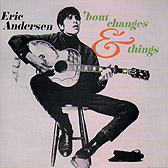 |
Andersen, Eric - Singer/songwriter; became highly visible about 1966 when Beatles manager Brian Epstein showed interest in managing; gave credence to electric music, but kiss-off to acoustic, by re-recording his acoustic second album, 'bout Changes & things (1966), over again as his third album, 1967's 'bout changes & things, take 2. Recorded for Vanguard ('66-'69), Warners ('70), Columbia ('73), and Arista ('75-'77).
|
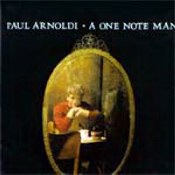 |
Arnoldi, Paul - Wyoming-born performer, became Cambridge transplant in early 60s, filled in for John Cooke (Summer, '62) in Charles River Valley Boys. Recorded album for Kapp (KL-1478) with notes by friend Dick Fariña.
|
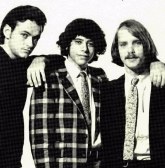 |
Banana - aka Lowell Levinger - Transplanted Californian and acting student at Boston U. circa 1963, played bluegrass next summer, and joined up as a piano/organist with Jesse Colin Young in 1966 to create the Youngbloods (RCA), later solo on Warners (early 70s). Played guitar and toured with Mimi Fariña in late 70s.
Banana with two out of three early Younbloods; 1967 photo from LSP-3724 : The Youngbloods
|
Basler, Fred - manager, folk club, Golden Vanity , Boston, later opened folk club in Baltimore ('63).
|
|
 |
Blue Ridge Mountain Dancers - Way-too sprightly dancers from Ashville, North Carolina, lead by Joe Bly, performing twice at New Folks Concert, Newport '65 (#3 on the concert schedule, and again at #9)
|
 |
Boyd, Joe - Harvard student, roommate of Tom Rush, and record collector; began promoting blues concerts. By mid-'60s, he was working for Elektra Records as their UK rep; in 1966, he produced the first Pink Floyd single, "Arnold Layne", going on to produce the early Incredible String Band, Fairport Convention (and later Sandy Denny solo & with her band Fotheringay), and just about everyone else folk-related for a few years . He also produced both Geoff & Maria Muldaur albums ('71-'72), and several of Maria's solo albums for Reprise. Boyd published his autobiography, White Bicycle, in March of 2007.
|
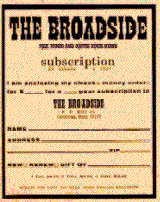 |
Broadside (Boston)- Local Cambridge folk scene paper, started in 1962 by David Wilson. As stated nicely by David Seeman, the Boston Broadside " was not at all political but rather a music journal with concert listings, record reviews, and accounts of the culture change that was happening in the mid-60s. Eventually it merged with another alternative paper, The Free Press, and was printed back-to-back upside down with that more newsy magazine for awhile. I don't know when it died but I imagine in the late 60s or early 70s."
|
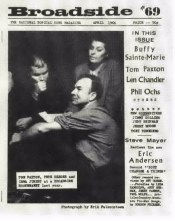 |
Broadside (New York) - Regarded as highly opinionated, it was "filled with insider's chit chat and gossip", eventually run by Sis Cunningham, it published a large number of folksongs, particularly those politically-oriented, including "Birmingham Sunday" by Fariña. Sis Cunningham's personal files, recordings and ephemera now reside in the Manuscripts Collection of the University of North Carolina at Chapel Hill as Broadside Collection #20289.
|
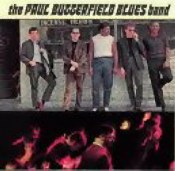 |
Butterfield Blues Band - Fronted by Chicagoan Paul Butterfield, the band was started in 1964 and signed to Elektra, they recorded their first album in December '64 and it say pressed, jacketed and packed for shipping when producer Paul Rothchild and label head Jac Holzman agreed it wasn't the album they'd hoped for. Plans were then made to record a live album in Chicago in December of '64, at great expense, and was at the edit stage when everyone agreed, again, it wasn't the album they'd hoped for. Re-rerecorded in a NY studio with borrowed equipment (all theirs had been stolen when the Chicagoans unloaded it on the sidewalk in front of the Albert Hotel and expected it to be there five minutes later ), it was finally released in the spring of '65. Their performance at Newport in '65 was first and foremost and powerhouse, warp 5 production, and caused waves of excitement when they opened the festival on Thursday night, at several workshops, and the closing night opening. The band featured Butterfield on harmonica, Mike Bloomfield and Elvin Bishop on guitar, Jerome Arnold (bass), Sam Lay (drums), and originally, Mark Naftalin (later of Mother Earth) on organ. The first album featured the first-time suggestion "That you play this record at the highest possible volume." They hit their stride with their next album, the landmark East West (1966). The band went through various mutations and recorded 4 more albums for Elektra before disbanding in 1971. Butterfield moved on to his Better Days band in 1973 (w/ Geoff Muldaur and Amos Garrett - Muldaur says they were playing on a bill with an older, revered bluesman who grabbed him backstage and pointed to Butterfield and said, "Do you KNOW who that IS ? DO YOU KNOW WHO THAT IS?" Muldaur says he hadn't thought about up to that point, but after it, "I thought about it a lot". )
see : Butterfield discography
|
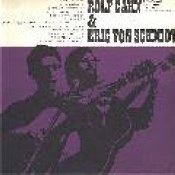 |
Cahn, Rolf - -German-born, heavily political guitarist, gave guitar lessons (to Mitch Greenhill among others), lived on Dana St. in Cambridge, recorded solo for Folkways as well as a joint album with Eric Von Schmidt for that label in 1961. Later moved to Berkeley with Debbie Green and started a club named Cabale.
|
 |
Camp, Hamilton - Actor and singer, performed originally as Bob and made a 1961 LP for Elektra with Bob Gibson, did a 1964 album for Elektra, then, after a religious conversion (, I believe) as Hamid Hamilton Camp for Warner Brothers, as well as performing as vocalist with the Skymonters ( recording for Mountain Railroad). Early champion of Dylan's songs. He also wrote "Pride of man", a folk perennial. Performer #4 at Sunday afternoon New Folks concert, 1965.
|
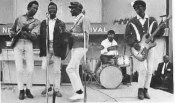 (photo : Chambers Brothers w/ Sam Lay, New Folks concert, Newport Folk Festival, 7/25/65 - photo by David Gahr)
|
Chambers Brothers - Lea County, Mississippi group, though one brother had attended the same highschool in Brooklyn as Fariña; originally just Willie, Joseph, Lester and George Chambers, they started out doing gospel, eventually working their gospel harmonies into folk tunes, sung and unsung (witness their "Bottle Music" on the Newport '65 album); they performed electric (with Sam Lay on drums) at the Newport New Folks concert (# 7) on Sunday before it rained, to no fuss whatsoever (unlike Dylan later that night), performing a pre-Little Richard ("She's got it") traditional song, "I got it", which came as close as that weekend could to showing that rock was just gospel and R&B signed to a bigger record label. They recorded their live show-stoppers, "Shout" and "People Get Ready" for Vault in 1965 , before adding Brian Keenan on drums and allowing their "soul's been psychedelicized", and switching to Columbia in '68 and having a massive hit with "Time has come today".
|
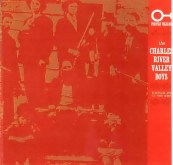 |
Charles River Valley Boys - Bluegrass from the Charles River delta, founded in the late '50s by Bob Siggins, Ethan Signer and Eric Sackheim (who left in 1960 on a Fulbright to Japan), with Clay Jackson also an early regular. Formerly the Laurel River Valley Boys, they were renamed by Lynn Joiner, who also recorded them privately in 1960. An album, "Bringin' in the Georgia Mail" was partially recorded in London at Dobell's Jazz Record Shop. After various personnel changes in the next two years, they recorded an album for Prestige in 1962 , produced by Paul Rothchild at the Harvard Music Association Library with a line-up including Fritz Richmond and John Cooke. After another Prestige LP in 1964, the group recorded a justifiably well-remembered collection of Beatles songs redone in bluegrass for Elektra in 1966 ( this time with Jim Field, Siggins, Joe Val, Everett Lilly, Craig Wingfield, Eric Thompson and the ubiquitous Buddy Spicher on fiddle).
|
. Registration Number: PA-891-604 Title: C for conscription / words by Pete Seeger ; music adapted from traditional blues. In: Where have all the flowers gone, p. 12 Claimant: Stormking Music, Inc. Created: 1940
Published: 30Dec93
Registered: 4Aug97
Special Codes: 3/M
|
Copyrights - A funny area in the mid-60s revival. Traditional melodies were always adapted to current use, words changed and notes tweaked. Because nobody was making any money at it. But when folk music became bankable, and publishers got interested in latching onto rights, things could get a little hairy. Jackie Washington, according to Baby Let Me Follow You Down, still burns over his arrangement of "Nottamun Town", a traditional song he heard being done by Jean Ritchie, which Washington had changed to a minor key and played for Dylan, and which shortly thereafter appeared, copyrighted, as "Masters of war". Pete Seeger says, in How Can I Keep From Singing that "...Songs not destroyed were often stolen; attaching the words "adapted and arranged by" gave two cents extra royalties per disc to the singer." He also says in the late '50s, Alan Lomax had asked him to acknowledge him as the owner of the songs he and his father had collected, and Seeger puzzled, "How could Alan... claim royalties from songs that had belonged to the public domain?"
|
 |
Court, John - Assistant to Albert Grossman, he handled press relations, shoed people from the studio,, co-produced Don't Look Back and earned a thank-you from Dick ("for his bubblegum machine") in his liner-notes to Reflections In a Crystal Wind.
|
Ó 2010. Greg Pennell
Last updated, 8 feb'10
|
Last modified: 8 feb'10